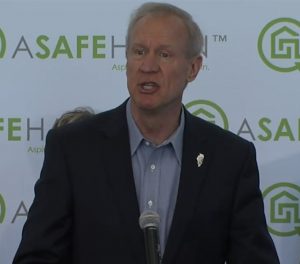State gets approval for behavioral health initiative
By Kevin Beese Staff reporter — May 14, 2018
: Neli Vasquez Rowland, president of A Safe Haven, a Chicago nonprofit focused on helping individuals in poverty and those who are homeless, talks about the benefits of a coordinated effort to address behavioral health issues. She said the state using $2 billion in Medicaid funding differently is “the answer to our prayers.”
Neli Vasquez Rowland remembers growing up in Chicago’s Little Village neighborhood and knowing lots of people denied access to drug and alcohol treatment.
“Growing up, I thought it was a morally corrupt thing that people had, that they made bad decisions and deserved to be in prison,” said Vasquez Rowland, president of A Safe Haven, a Chicago non-profit focused on helping rebuild lives from poverty and homelessness. “That’s what happened to many of my friends who grew up in Little Village and to today are probably serving time from having suffered from these issues.”
Eventually dealing with substance abuse in her own family, Vasquez Rowland said she saw how services were in individual silos, fragmented from each other.
“It was putting people who were really sick at the mercy of the criminal justice system, the emergency health care system, which basically was a revolving door,” she said. “Once you had this problem, you fell through the cracks and ended up living on the streets, in the criminal justice system or dying.”
She said the state getting a waiver to use $2 billion in Medicaid funding differently is “the answer to our prayers.”
Illinois has gotten federal approval to launch a behavioral health initiative designed to deliver better outcomes for Medicaid beneficiaries suffering from mental health issues and substance abuse disorders.
The Better Care Illinois Behavioral Health Initiative is the culmination of a 2½-year effort to involve state health agencies, legislators and behavioral health organizations in a coordinated plan to help people with disorders that requires treatment of the whole person.
“The Better Care Illinois effort is one of the most significant developments in the history of Illinois’ health programs,” Gov. Bruce Rauner said last week in announcing the behavioral health initiative. “For the first time here in Illinois, we are in a position to devote massive integrated resources to the devastating effects — personal and societal — of behavioral health problems.”
Rauner said the health initiative puts a focus on prevention and public health, pays for value and outcomes rather than volume and services, makes evidence-based and data-driven decisions, and moves individuals from institutions to community care, to keep them more closely connected with their families and communities.
“The waiver will allow the state to care for its most vulnerable citizens earlier and more efficiently,” Rauner said. “Better Care Illinois will use an integrated approach so we can focus on helping the whole person and get the right services to the right person in the right setting at the right time.”
State officials noted the waiver is not a grant but rather an opportunity to use $2 billion in Medicaid money to increase the efficiency and quality of care for Medicaid populations. The state got the go-ahead to launch the initiative from the federal Centers for Medicare and Medicaid Services.

Gov. Bruce Rauner talks about a state behavioral health initiative that will use Medicaid money differently “so we can focus on helping the whole person and get the right services to the right person in the right setting at the right time.”
The waiver means that beginning July 1, Illinois can begin investing $2 billion in federal funds in 10 pilot programs to demonstrate better care alternative and outcomes. The pilot programs will feature newly created delivery systems designed to improve care, increase the value of patient experiences and produce better outcomes for the dollars.
Rauner said that Better Care Illinois is also a win for state taxpayers who over time will see better health outcomes without spending more state dollars. The demonstrations will result in more early help for beneficiaries, so savings can eventually be invested in more cost-effective services, the governor said.
He noted that 750,000 beneficiaries — 25 percent of Illinois’ Medicaid population — have behavioral health conditions and account for 52 percent of Medicaid spending.
Thirteen state agencies participated in the development of the approved application.
“The opioid crisis and violence in our communities call on us to find better ways to help those in need, and that is what we are accomplishing with this transformation,” said Felicia Norwood, director of the Illinois Department of Healthcare and Family Services, the state’s Medicaid agency. “Smarter spending will lead to healthier lives and safer communities. By bringing state agencies and medical providers into closer cooperation for our members, we ensure stronger whole person care for vulnerable individuals.”
—- State gets approval for behavioral health initiative —-







